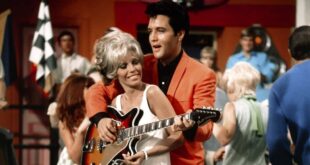[ad_1]
Back in 1964, John Frankenheimer’s American-French production The Train first hit cinemas.
The World War II movie was set in August 1944 and followed French Resistance fighter Paul Labiche, played by Burt Lancaster, taking on Paul Scofield’s German Colonel Franz von Waldheim.
The Nazi officer’s mission was to move stolen works of art by train back to Germany.
The Train was loosely based on 1961 non-fiction book Le front de l’art by Rose Valland, who was the art historian at the Galerie nationale du Jeu de Paume.
She documented the masterpieces in storage there that had been looted by the Nazis from French museums and private art collections to be taken back to Germany.
In real life, the shipment was indeed held up by the French Resistance on August 1, 1944. However, unlike the action in the Burt Lancaster movie 20 years later, the Nazi’s plan was foiled by endless paperwork and red tape, meaning the priceless works only made it a few miles outside of Paris.
In reality, train No 40,044 was seized and looked over by Lt Alexandre Rosenberg of the Free French forces just outside the capital city.
Once the doors of the carriage were open he found several works of art that had been owned by his father, art dealer Paul Rosenberg.
The Train movie’s action featured a number of real wrecks and the Allied bombing of a rail yard was made possible thanks to actual dynamite.
Director Frankenheimer believes The Train to be the last big action movie that was shot in black and white, which he thinks tremendously added to the final product.
Lancaster himself had played a part in World War II by joining the US Army in January 1943. The future Hollywood star performed with the 21st Special Services Divisions, following troops on the ground and providing USO entertainment for the sake of morale. After serving under General Mark Clark’s Fifth Army in Italy from 1943-1945 he was discharged in October after the war’s end.
 FARRATA NEWS Online News Portal
FARRATA NEWS Online News Portal






